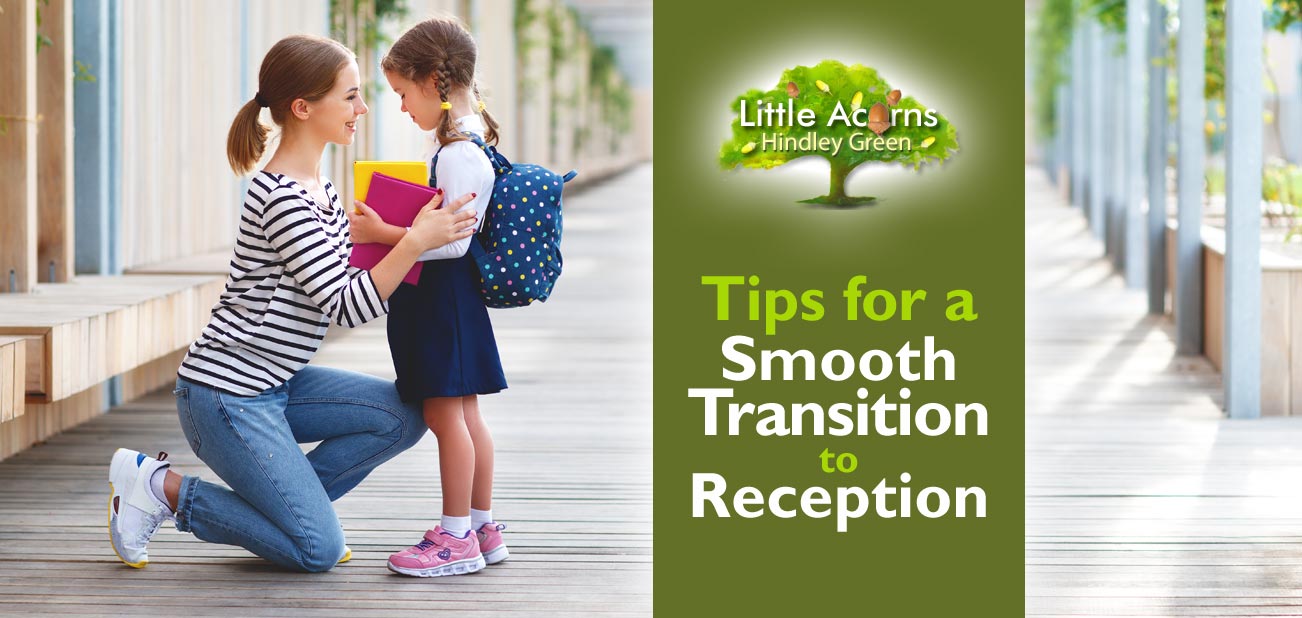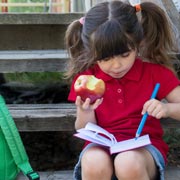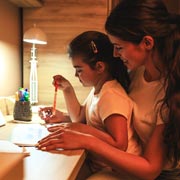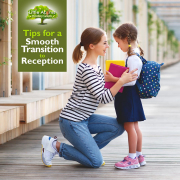
 The transition from preschool to Reception marks a significant milestone in any child’s life. It can be emotional for parents and, for children, it can be a period filled with excitement, curiosity, and perhaps a bit of apprehension. Ensuring a smooth transition involves a combination of careful planning, practical strategies and emotional support. With that in mind, today’s guide outlines more than twenty simple, actionable ways to ensure your child has a seamless transition and a positive start to school life.
The transition from preschool to Reception marks a significant milestone in any child’s life. It can be emotional for parents and, for children, it can be a period filled with excitement, curiosity, and perhaps a bit of apprehension. Ensuring a smooth transition involves a combination of careful planning, practical strategies and emotional support. With that in mind, today’s guide outlines more than twenty simple, actionable ways to ensure your child has a seamless transition and a positive start to school life.
Emotional Support Strategies
Talk About Feelings
Discuss emotions related to starting school. Encourage questions, answer honestly, and address any concerns your child may have. Doing so will reassure your child and create a more positive perception of the upcoming experience.
Positive Reinforcement
 Use positive reinforcement to create a positive association with the idea of school. For example, highlight the exciting aspects of learning, making friends, playing new games, and discovering new things.
Use positive reinforcement to create a positive association with the idea of school. For example, highlight the exciting aspects of learning, making friends, playing new games, and discovering new things.
Celebrate Small Achievements
Acknowledge and celebrate small achievements. Whether it’s successfully completing a puzzle or putting on shoes independently, recognising these accomplishments builds a positive mindset and boosts children’s confidence.
Visit the School Together
Arrange visits to the school — take a guided tour together and explore the classrooms and play areas. This will make the environment less intimidating and more welcoming and familiar when the time comes.
Building Skills
Build Social Skills & Make Play Dates
 Organise play dates with future classmates to build social connections before the first day. Encourage interactions with other children to develop essential social skills. Attending a nursery, preschool, or playgroup will provide excellent opportunities for this.
Organise play dates with future classmates to build social connections before the first day. Encourage interactions with other children to develop essential social skills. Attending a nursery, preschool, or playgroup will provide excellent opportunities for this.
Practise Listening Skills
Engage in activities that enhance your child’s listening and attention skills. These will be essential once they begin at school.
Promote Independence & Responsibility
 Foster self-reliance by allowing your child to perform simple tasks like dressing themselves, tidying up, using the toilet, and organising themselves. Also, assign small responsibilities to them at home to instil a sense of accountability and responsibility. Such skills will serve them well once at school.
Foster self-reliance by allowing your child to perform simple tasks like dressing themselves, tidying up, using the toilet, and organising themselves. Also, assign small responsibilities to them at home to instil a sense of accountability and responsibility. Such skills will serve them well once at school.
Encourage Decision-Making
Provide simple choices to empower your child and foster decision-making skills. You can perhaps teach them how to weigh up the pros and cons of each choice they face, so they get a feel for how best to approach a final decision.
Read Together
 Read age-appropriate books together, particularly those that introduce topics they’ll be introduced to in Reception class. This not only sparks excitement and teaches them new things but also helps children understand what to expect. Instil a love for reading through interactive reading sessions. Visit the library too and explore a variety of books.
Read age-appropriate books together, particularly those that introduce topics they’ll be introduced to in Reception class. This not only sparks excitement and teaches them new things but also helps children understand what to expect. Instil a love for reading through interactive reading sessions. Visit the library too and explore a variety of books.
Educational Games
Incorporate fun and interactive learning activities into daily routines. Simple mathematics games, storytelling, and creative arts and crafts can enhance cognitive skills and nurture a love for learning.
Fine Motor Skill Development
Strengthen fine motor skills through activities like drawing, cutting, and building with blocks. These activities not only aid in academic readiness but also contribute to overall coordination.
Nearer the Time
Introduce the Concept of Time
 Ensure that your child understands basic time concepts, such as morning, afternoon, and evening. This, in tandem with our next tip below, will help your child better understand the structure of the school day.
Ensure that your child understands basic time concepts, such as morning, afternoon, and evening. This, in tandem with our next tip below, will help your child better understand the structure of the school day.
Establish a Consistent Routine
In the run-up to leaving nursery/preschool to begin at school, introduce a consistent daily schedule that mirrors the school routine. This will help your child become familiar with the structure of the day and help them to adjust more naturally.
Create a Homework Station
Designate a comfortable and quiet area at home where your child can engage in reading and other learning activities. This can later transition to become a natural place for school homework and be a tool to promote a positive attitude towards learning.
Introduce Uniforms
If applicable, gradually introduce your child to the concept of wearing a school uniform and get them used the the process of getting dressed.
Teach Basic Self-Care
 Ensure your child can manage basic self-care tasks independently. Such skills will be invaluable to them once they have started school.
Ensure your child can manage basic self-care tasks independently. Such skills will be invaluable to them once they have started school.
Practise Sharing
Emphasise the importance of sharing and taking turns through play. This is not only good manners but will also help them make and keep friends.
Encourage Expressing Needs
Teach your child to communicate their needs effectively. Good communication is an essential tool for any child. Explaining their needs to teachers and peers will ultimately result in happier outcomes and contribute to children’s well-being.
Establish a Bedtime Routine
 Ensure sufficient sleep by establishing a calming bedtime routine. This not only gets them used to a pattern but will also help them to maintain focus and energy levels once at school.
Ensure sufficient sleep by establishing a calming bedtime routine. This not only gets them used to a pattern but will also help them to maintain focus and energy levels once at school.
Create a Visual Schedule
Use visual aids to help your child understand and anticipate daily activities. This could be a simple colour-coded timetable, or a series of drawings depicting activities they will be undertaking during their school day.
Create a Consistent Drop-off Ritual
Develop a consistent and reassuring routine for dropping off and picking up. This will foster a sense of security for the child and be key to minimising any separation anxiety that may otherwise occur.
Reception & Compulsory School Age
Reception is the first year of primary school in England, coming after nursery but before Year One. Children joining Reception class usually begin there in the September after their 4th birthday. Compulsory School Age, however, begins later — at the end the December, March or August that follows their 5th birthday (whichever is soonest).
 The journey from preschool to the first day of school is a significant milestone for both parent and child. Preparing children for school involves a holistic approach that addresses emotional, social, and practical aspects. By incorporating these strategies into your family’s daily routine, you can contribute to a positive and confident transition for your child and set the stage for the most successful start to their school journey.
The journey from preschool to the first day of school is a significant milestone for both parent and child. Preparing children for school involves a holistic approach that addresses emotional, social, and practical aspects. By incorporating these strategies into your family’s daily routine, you can contribute to a positive and confident transition for your child and set the stage for the most successful start to their school journey.
School-Readiness at Little Acorns Nursery, Hindley Green

 Here at Little Acorns in Hindley Green, we also follow comprehensive strategies to build children’s skills, knowledge, independence and confidence in the run-up to beginning primary school. Indeed, we ensure they have hit personal bests in every area and are school-ready by the time they leave us for Reception. It’s magical to see how each and every child grows, in so many ways, during our time with them. It’s always sad to see them go when they leave to begin school but, when that time comes, we wish them every success in the knowledge that they leave superbly well-equipped for their journey.
Here at Little Acorns in Hindley Green, we also follow comprehensive strategies to build children’s skills, knowledge, independence and confidence in the run-up to beginning primary school. Indeed, we ensure they have hit personal bests in every area and are school-ready by the time they leave us for Reception. It’s magical to see how each and every child grows, in so many ways, during our time with them. It’s always sad to see them go when they leave to begin school but, when that time comes, we wish them every success in the knowledge that they leave superbly well-equipped for their journey.
A High-Quality Childcare Nursery for Your Child in Hindley Green
Are you looking for a really good childcare nursery in Hindley Green, near Wigan? Please get in touch with us at Little Acorns Nursery if so. We offer a superb childcare service and early years education to babies, toddlers and preschoolers aged under five. We support many Government-funded ‘free childcare’ schemes too, meaning childcare will be more affordable for eligible families.
Little Acorns is also near Bickershaw, Leigh, Atherton, Westhoughton, Ince-in-Makerfield, Platt Bridge, Tyldesley, Bolton and Greater Manchester, so may additionally suit families in those areas.


